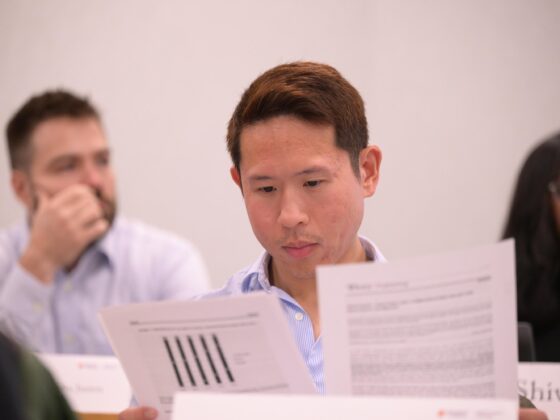As we mentioned in our earlier FAQ blog post, Executive MBA applicants have two options when it comes to standardized tests — take a standardized test or submit a test waiver request. We receive many questions about this topic, and this post features a few things to consider when it comes to weighing the options for standardized tests.
Waiver Request Form
Applicants who feel they can make a strong case for a test waiver are welcome and encouraged to submit a waiver request.
The waiver request form can be found in the Test Scores section of our Executive MBA application, and waiver requests are considered along with the full application.
Applicants should use the text box in the waiver request field to highlight any aspects of their educational and/or professional background they feel are relevant to our Admissions Committee’s evaluation. In considering waiver requests, our Committee will pay particular attention to your prior coursework (both degree-related and non-degree-related), advanced degrees, professional certifications and work responsibilities.
If you were granted a test waiver in a prior cycle and wish to be considered for a test waiver in this cycle, you should submit a new waiver request following instructions outlined above.
Pro Tip: As you may know, the EA, GMAT and GRE are all currently available online. We realize that COVID-19 has disrupted the lives of all of our prospective students and applicants. For this reason, we encourage you to use the test waiver request to focus on your background rather than current circumstances. This is your opportunity to make a case for a test waiver. Make the most of it!
Test Waiver Decision Outcomes
An update regarding the outcome of the waiver review will be provided at the time of decision.
For candidates who submit a test waiver request, there are four decision outcomes.
- Admit
- Conditional Admit (additional action required – for example, quantitative coursework)
- Waitlist
- Deny
Conditional Admit Decision Status: Candidates who receive a conditional offer will need to take some action to receive a full offer of admission — for example, earn a B+ or better in two online courses in the areas of Accounting or Finance. The conditions of the admission offer are set by our Admissions Committee and detailed in the applicant’s offer letter. Candidates typically have around three weeks to satisfy their offer condition. Applicants who receive a conditional offer will be evaluated for a scholarship award once they satisfy their offer condition.
Waitlist Decision Status: If a candidate who submits a test waiver request is placed on our waiting list, taking a standardized test or doing additional quantitative coursework would be ways for that applicant to potentially strengthen his or her application.
Standardized Tests
When considering your test options, think about your application as our Admissions Committee will — with a holistic mindset. There are some candidates who may benefit from having a standardized test score. For example, if your undergraduate GPA is lower or your academic/professional background is less quantitative or analytical, a test score is one way of providing our Admissions Committee with a recent data point for your readiness for Darden’s rigorous academic experience. As you may know, in our Executive MBA Program, there are several required core classes that are more quantitatively-oriented, such as Accounting, Finance, Decision Analysis and Global Economics.
On a more general note, we accept several standardized tests in our Executive MBA application process — the Executive Assessment (EA), the GMAT, GRE, the MCAT and the LSAT — and we view these tests equivalently. We will also accept an older or expired score for any of these tests, but candidates who wish to submit an expired score will need to have access to their full score breakdown.
If you plan to take a test, we recommend choosing the test that best aligns with your strengths and application plans. In recent years, the Executive Assessment has become the most popular test with our applicants. It was designed in consultation with top Executive MBA Programs and with executive format applicants (and their busy schedules in mind). It is a 40-question, 90-minute test, and it requires on average 20 hours of preparation. The EA is currently available online, and, depending on your location, in person.
Over the past few years, we have received a wide range of EA scores, and we have students with EA scores ranging from the low 140s to the high 160s in our matriculated Executive MBA classes. For the past three years, our average EA score has been 153.
A standardized test can be a test-drive for your Executive MBA experience.
At around 20 hours of prep time, studying for the EA is a fair approximation of the amount of work a student in an Executive MBA program will manage during a busier week. Wondering how you might be able to balance your many commitments and school? Try studying for a standardized test. This will allow you to dip a toe in the water of school-related time management, and, on a micro-scale, help the other people in your life understand what participating in an Executive MBA program might look like for you (and them).
If you’re like many applicants, it may have been a while since you last studied for a test. A standardized test is a good opportunity to get back in the habit of studying for and taking tests. Time to dust off those study skills and stretch those academic muscles!
Have more questions? We invite you to schedule a conversation to connect one-on-one with a member of our Admissions Committee.
Check out faculty thought leadership published on Ideas to Action. And stay connected with us via social media: Facebook, Instagram, LinkedIn, Twitter, WeChat





